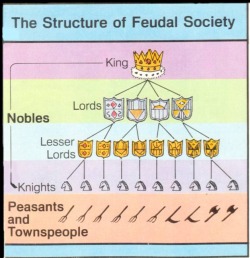Historical Background
- Britain was conquered by many civilizations. First the Celts who were overpowered by the technologically advanced Romans who remained the rulers of the land for over 300 years
- Britain was then conquered by the Anglo-Saxons from Germany
- The Romans adopted Christianity as the religion of their civilization
- A long time after the Romans, the Danes from the east made their way through England and conquered the northern, eastern, and central regions of England
- The Normans also squeezed themselves in England and when King Edward died, William of Normandy took the throne
- Britain took on a feudal society :

- The plantagenets ended up taking over the rule of England and kept feudalism as the structure of the government
- as time went on, the lower classes began to revolt and gain some respect and at least money for the jobs they were doing
Literature of the Period
- Anglo-Saxon literature was mainly poetry
- A popular example would be Beowulf but the author is unknown due to poor record keeping
- Many different works were produced from the Anglo-Saxons in mainly Latin and some in Old English
- Geoffrey Chaucer was a great poet from the Medieval Ages, he produced works that portrayed the life and times of the Middle Ages, knights doing good deeds, and romance
- Many plays were made after stories from the bible
- Johann Gutenburg created a printing press through typing which sparked new literary works
- Chaucer was just below and aristocrat in terms of social class which gave him a great viewpoint for his poetry
- Chaucer changed the game of literature for the Middle Ages
- He wrote about things that were compassionate and included humor in his work
- A great Celtic Hero named King Arthur was highly written about in Medieval Times as a heroic and courageous icon
- Historians aren't completely sure if King Arthur ever existed and some think he was just a fictional character like Spider-Man or Huckleberry Finn
- Tales of King Arthur spread all throughout Europe, changing the image of him
- the ballad was another popular expression of love or admiration
- A famous ballad is of Robin Hood, a bandit-like character that robbed the rich to help the poor
The Changing English Language
- around 449 B.C., the Celts, Danes, Angles, Normans, and Romans all occupied around the same area in Britain began mixing their languages together in a Frankenstein-like creation called "Englisc"
- After about 100 years, the Normans took over more of England and introduced more French influences on the growing language
Preparing to Read The Seafarer, The Wanderer, The Wife's Lament
- Britain's Anglo-Saxon's period had lots of entertainment in the forms of plays or storytellings
- many stories came about from legends or tall tales told down from generation to generation like the Native Americans
- In the Anglo-Saxon society, women had few rights, and men were the more dominant gender
